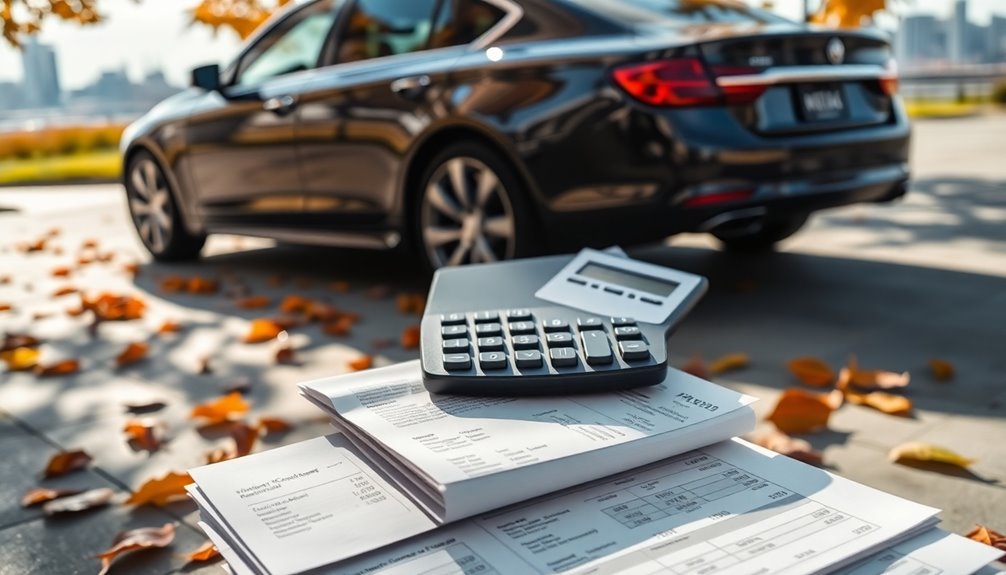Between 2014 and 2018, the 25 richest Americans saw their wealth grow by $401 billion. Yet, they only paid $13.6 billion in federal income taxes. This means their real tax rate was just 3.4%1. Such figures reveal how high earners use legal ways to pay less tax, something not always clear to average earners.
This piece will show you how the wealthy dodge taxes using legal gaps and options. You will see how owning certain investments, using trusts, and planning estates can lead to lower taxes. Such methods reveal how to lessen tax load legally.
Grasping these methods will light up ways to better tax benefits if you’re well-off. It guides you through tax intricacies smartly and with vision.
Key Takeaways
- The true tax rate for the wealthiest Americans can be significantly lower than that of the middle class.
- Many wealthy individuals utilize legal tax avoidance strategies to reduce their liabilities.
- Understanding asset ownership and investment income can optimize your tax situation.
- While the average property tax rate is 1%, the wealthy often have their financial structures designed to minimize taxes.
- Strategic use of trusts and estate planning can help in transferring wealth less taxably.
Understanding the Wealthy Tax System
The tax system for the wealthy has special benefits that rich people use to lower their taxes. Much of their income comes from increases in the value of their assets, which aren’t taxed until sold. For example, Mark Zuckerberg’s net worth shows how growing assets can build wealth without immediate taxes2. This way of delaying taxes fits well with how the system favors gains from investments over usual income.
Rich folks often gain from a tax system that charges different rates, from 10% to 37% federally. This highlights how the kind of assets and income they have affects their tax bills. A new idea suggests taxing these unsold gains, aiming at those worth over $100 million2. This could change how 2,600 taxpayers are taxed, helping the government make more money.
Some people worry that taxing hard-to-value assets every year could be tough and push rich people to move to places with lower taxes. Research from UC Berkeley says a wealth tax might hit just 0.06% of U.S. families, showing it targets a small group3. This situation shows the tricky parts of taxing the wealthy, making us think more about how wealth and taxes work in the U.S.
The Concept of “Buy, Borrow, Die” Strategy
The “buy, borrow, die” strategy is a key plan for many rich families dealing with wealth taxes. It’s based on buying assets, then borrowing against them. This lets people get money without paying taxes on it.
Instead of selling assets and paying a big 20% tax, people use this strategy to keep their investments. They wait until they die to pass them on. When heirs get these assets, they don’t pay taxes on the sale. This is because of the “Step-up in Basis” rule, which changes the asset’s purchase price to its value at the owner’s death4. For example, a ProPublica report showed that the 25 wealthiest Americans had an amazingly low average tax rate of just 3.4%5 in certain years. This shows how well the strategy can work for those with a lot of money.
Also, more people now want loans that use stocks as collateral. Morgan Stanley says their clients have taken out an incredible $68.1 billion in loans like this4. This move is a big part of sophisticated wealth management strategies. It’s especially attractive for those wanting to keep and increase their family’s wealth.

Getting how this strategy works helps explain how managing assets helps in transferring wealth. First, you buy assets that increase in value. Then, you borrow against this higher value. And in the end, your family gets a tax-free inheritance. This way, your wealth grows while you keep taxes low.
Step 1: Buy Assets to Build Wealth
The key to building wealth is getting assets like real estate, stocks, and collectibles. Rich families often grab these valuable assets to grow their money. These buys help their assets’ value go up over time, all without paying taxes unless they sell6. This smart move builds wealth and saves on taxes.

Things like real estate and fine art can beat inflation and market ups and downs6. Investing wisely in these items can cut down tax bills. It’s crucial to stay savvy about your investments and check your financial plan often, especially during big life changes7.
Using these assets for loans is smart because the loans aren’t taxed6. This trick lets you keep cash on hand without paying taxes on your investments. As your wealth increases, you can set up a legacy for your family. Heirs often don’t have to pay taxes on what they inherit6.
Adding IRAs or 401(k)s to your wealth strategy can help too. Knowing how to invest wisely and planning your estate well brings big rewards. It lets you grow and protect your wealth for your loved ones’ future7.
Step 2: Borrow Against Your Assets
Wealthy people often take loans against their assets. This method helps them get cash without having to sell anything or pay extra taxes. By using leverage in wealth management, they take loans with their assets as security instead of selling them. This avoids paying taxes on any gains. People like Warren Buffet and Elon Musk, pay less taxes than many professionals by doing this8.
There are different types of loans available. Home equity lines of credit (HELOCs), margin loans, and securities-based lines of credit are some examples. A HELOC usually lasts for 30 years, with a 10-year period for borrowing and 20 years for paying back9. For a margin loan, you need at least $2,000 in cash or securities. You can borrow up to 50% of your investments’ value with it9. Securities-based lines of credit let you borrow up to 70% of your securities’ market value9.
These loans are great because the money you get from them isn’t taxed8. This lets wealthy people keep living lavishly without increasing their taxable income. It sets up a beneficial debt vs. taxes situation.
Let’s look at different borrowing options:
| Type of Loan | Borrowing Limits | Repayment Terms | Ideal Use |
|---|---|---|---|
| HELOC | Based on appraised home value minus mortgage | 30 years total (10-year draw, 20-year repayment) | Debt consolidation, home improvements |
| Margin Loan | 50% of assets’ value | Revolving credit, no set periods | Stock purchases |
| Securities-Based Line of Credit | Up to 70% of market value of pledged securities | Revolving credit | Bridge financing |

By using these financial strategies, you can grow your wealth and keep taxes low. It shows the importance of smart leverage in wealth management.
Cash values in permanent life insurance policies also grow without being taxed. They can offer another way to borrow, adding to your ability to manage money smartly8.
Step 3: Transfer Wealth Tax-Free to Heirs
Estate planning is key to moving wealth to heirs without big taxes. In 2024, you can pass up to $13.61 million to others tax-free. This rule helps a lot in estate planning10. Using inheritance tax strategies like annual gift exclusions also helps. You can gift $18,000 per person in 2024. This lowers the future value of the estate11.
Turning to strategies like Roth IRA conversions can help too. It lets assets grow and be given to heirs without taxes10. Irrevocable trusts make estate plans even better. Trusts like grantor retained annuity trusts (GRAT) and intentionally defective grantor trusts (IDGT) move rising assets out of the grantor’s estate but still let the grantor access cash flow10.
Teaching heirs about money is crucial to prevent wealth loss over generations10. For better tax-free wealth transfer, work with tax and wealth planning experts. They can sharpen your plan and cut down tax worries. This help is key because estate tax can be up to 40% for wealth over the exemption11.

Why Intellectual Property Matters
Intellectual property, also known as intellectual property as an asset, is really important for growing your money. In fact, 60% to 90% of what S&P 500 companies are worth comes from things like patents and copyrights12. Wealthy people use these rights smartly to make more money, improving their financial health.
In 1982, to show how much value is placed on intellectual property, Congress set up a court just for patent issues13. The TRIPS agreement lets companies make money from their patents for 20 years without immediate tax13. This way, companies can make a lot from their inventions and pay taxes later when they earn profits.

Each year, more than $1 trillion goes from the general public to those who have intellectual property13. People like Warren Buffet and Elon Musk have built huge wealth by using intellectual property wisely12.
Strategies for Keeping Cash Flow Low
Many wealthy people keep their cash flow low to manage their money better. By doing this, they deal well with taxes and keep their finances stable. They know cash flow problems can hit even successful companies if they have to pay debts before making enough sales14. To help, they use leasing for things like equipment, which lets them pay over time instead of all at once14.
They also borrow money smartly, like taking loans against their investments or using home equity lines. This way, they get the money they need without emptying their cash reserves15. Giving discounts for early payments helps them, too, because it makes customers pay faster14. Doing credit checks helps avoid late payments and protects their cash14.

Handling inventory the right way keeps them from having too much money tied up in slow-selling products14. They also put money in high-interest savings accounts to make more money while keeping it accessible14. Talking terms with suppliers or making short-term payment plans can also help cash flow14. These strategies aren’t just about keeping cash flow low; they’re steps toward growing wealth.
Managing money coming in and out smoothly, with the help of technology, makes everything run better16. Good cash flow management builds strong relationships with vendors, leading to better deals and helping your business grow16. Sometimes, raising prices is a strategy they use to improve cash flow and increase revenue14.
Tax-Deferring Investments and Their Benefits
Tax-deferring investments are crucial for managing wealth, especially through retirement plans for wealthy individuals. By putting money into plans like 401(k)s, 457s, or 403(b)s, you can delay paying taxes on what you earn until you take it out. This helps your investments grow more.
In 2025, you can put up to $23,500 in your 401(k), or $30,500 if you’re eligible for extra contributions【17】【18】. By not paying taxes right away, your money can grow a lot more. For example, $100,000 in a tax-deferred account can grow by almost $45,000 more than in a taxable account in 15 years【18】. Since long-term gains get taxed less, using these accounts is smart【17】.
Wealthy people’s retirement accounts allow for bigger contributions. They also let you deduct IRA contributions up to a certain limit from your taxable income. This reduction can lower your current taxes, showing another plus of tax deferrals【18】.

Leveraging Charitable Donations for Tax Benefits
Charitable donations can give you two big advantages. First, they help society and, second, they offer tax deductions. When you give to charity, you can lower how much tax you need to pay. This is really helpful for people who earn a lot. They could see big savings on taxes through giving. For example, if you give assets that have gone up in value, you can deduct their current value and skip the tax on the profit19. So, a smart donation might let you deduct an extra 23.8%20 from your taxes.

Donor-Advised Funds (DAFs) are great because they’re flexible and give immediate tax benefits. You can get a tax deduction right away by contributing cash, stocks, or other assets19. Also, if you’re over 70½, giving straight to charity from your IRA can be tax-free. This cap is at $100,000 a year21 and is perfect for retirees who want to lower their taxable income.
Knowing about deduction limits for charity gifts is key. You can deduct cash gifts up to 60% of your income but only 30% for stocks or other assets that have increased in value19. If you give more than these limits, you can use the extra amount for tax deductions in the future, up to five years.
To really benefit from giving to charity, use it as part of your tax strategy. There are different charity trusts, like Charitable Remainder Trusts and Charitable Lead Trusts, that have tax perks21. Including these in your long-term plans means you can continue to help others after you’re gone—while also cutting down on taxes.
| Type of Donation | Potential Tax Deduction Limit | Benefits |
|---|---|---|
| Cash Contributions | Up to 60% of AGI | Immediate tax deduction, reduces taxable income |
| Appreciated Securities | Up to 30% of AGI | Avoidance of capital gains tax, value maximization |
| Donor-Advised Funds | Full contribution amount | Flexibility, immediate tax savings |
| Qualified Charitable Distributions | Up to $100,000 per year | Tax-free transfers, reduces Medicare tax liabilities |
Using charitable donations in your financial plan can really lower your taxes and help your community. Planning these gifts carefully is essential to meeting both your money and giving goals.
Using Business Expenses to Legitimize Purchases
Rich people have a special trick up their sleeve. They use deducting business expenses to make personal buys look like they’re for work. This means they can buy fancy things, like luxury items, and get tax breaks. For example, they might use a private jet for both fun and work and still get a tax benefit.

Research shows that in 202322, the wealthiest 1% in the U.S. had 23.3% of all wealth. They’re smart with their money, making big buys look like work expenses to get deductions. For instance, they could claim a yacht or a lavish trip as a business cost under the right rules, like section 179’s $1,160,000 deduction limit for 202322.
Rich folks can dodge a lot of taxes by writing off their expensive hobbies, like horse racing23. With fewer checks on them, they’re finding even more ways to cut their tax bill23. This situation makes it more appealing for the wealthy to use every loophole they can find.
Turning high-end purchases into business expenses is a smart move. It lets you enjoy the finer things while being smart about money. But, it’s important to play by the IRS rules, especially since they’re watching the wealthy more closely now23.
How Philanthropy Played a Role in Tax Reduction
Philanthropy is a key strategy for wealthy folks aiming to cut taxes. They often give to charity, not just to help others, but to lower their own tax bills too. For example, in 2022, data showed that 41 cents of every dollar donated went to private foundations or donor-advised funds (DAFs). This move helps rich donors reduce how much tax they owe24.
By giving to private foundations or DAFs, donors get to oversee their donations better. They still benefit from immediate tax breaks. What’s more, these foundations have a median payout rate of 5.2 to 5.6 percent over the last five years. This means most of the money is kept invested, making their wealth grow24.
In 2021 alone, a whopping $2.5 billion in grants swapped hands between national donor-advised funds. This shows how flexible and strategic charitable giving by the wealthy can be. It’s a way to support good causes while smartly handling taxes24.
The way donations are made shows a trend. Big donors often favor areas like the arts, sports, education, and healthcare. It’s more about funding what they care about than just aiding the needy. In America, only about 20% of their giving goes directly to help those in poverty25.

Beating the System: Trusts and Estate Planning
For the rich, using trusts in estate planning is crucial to lower taxes while transferring assets. Trusts for avoiding taxes let people keep control over their wealth to ensure it stays in the family. There are many trust types, like revocable living trusts and irrevocable trusts. Each type plays a different role in protecting assets.
Trusts help avoid estate taxes, a big benefit. For example, the estate tax exemption is $13.61 million for single people and $27.22 million for couples in 202426. States with lower exemptions than the federal limit can mean bigger tax savings with the right trust. Trust structures can be customized for each person’s financial needs to lower state taxes26.
Smart use of trusts can save a lot of money. Wealthy people have moved billions into trusts to dodge federal estate tax. Despite the wealth of the richest Americans quadrupling, estate tax revenue hasn’t changed much since 200027. This shows a big chance for rich families to use trusts to save on taxes.
Estate owners can also give money or assets to others without tax effects up to $18,000 a year26. By doing things like funding education accounts, they can reduce their estate value. This makes their estate planning more tax-efficient.

How the Rich Avoid Paying Taxes (And What You Can Learn From It)
Getting to know how the rich use tax avoidance tricks can teach us a lot. They make use of strategies for tax reduction in smart ways, which can also work for us.

For instance, the wealthy often invest in something called tax-efficient areas. Imagine investing in an area where you only pay 5% in taxes instead of the usual 25%. This is how they save a lot of money through clever tax planning.
Here are some practical tips for taxpayers to save money too. By knowing about tax credits, deductions, and delaying income, you can lower your taxes. Donating to charity like the rich can also cut down your tax bill and improve your financial health.
Wealthy people use debt in smart ways, like in big purchases where most of it is borrowed. This way, they pay less in taxes right away. It’s a different way to think about investing and growing your money while keeping taxes low.
| Strategy | Description | Benefits |
|---|---|---|
| Utilizing Trusts | Transfer assets to a trust, reducing personal tax liability. | Tax-free growth of assets; control over asset distribution. |
| Investing in SEZs | Companies operating in special economic zones benefit from lower taxes. | Significantly reduced corporate tax rates. |
| Using Debt for Investment | Financing purchases through debt to minimize upfront cash flow. | Maintain liquidity while deferring taxes. |
| Philanthropy | Engaging in charitable donations can yield tax deductions. | Enhances public image while reducing tax burden. |
You don’t need to be rich to use these tax-saving tricks. With the right knowledge, you can use these strategies for tax reduction too. Watch what the wealthy do and adjust it to fit your money situation. These strategies can help you save and improve your financial wellness.
Knowing how the rich lower their taxes gives you the power to do the same, legally. Keeping up with tax avoidance techniques lets you smartly manage your money28.
Why Tax Lawyers Are Essential for the Wealthy
Wealthy folks have complicated tax issues, so tax lawyers for the rich are vital. They help those with over $5 million in assets use smart tax plans and stay within the law29. People with $10 to $49 million need legal advice even more to skip extra taxes29.
In the 1980s, tax lawyer Richard Covey created the grantor-retained annuity trust (GRAT). It let the super rich keep billions away from the IRS. This move worked well in the 1990s, despite Congress trying to stop tax dodges. It shows how lawyers play a key role in tax issues, using legal gaps to their advantage30. This technique helped create big trusts without instant tax costs, proving good advisors can hugely impact wealth.
Experts say families with more than $10 million should use complex tax plans. Tools like Dynasty Trusts and Family Limited Partnerships (FLPs) are crucial29. They guard against taxes and help keep wealth in the family.
To wrap up, wealthy people really need expert tax lawyers. They’re key for making the best tax moves and following the laws. Without them, wealthy families might lose a lot to tricky tax systems.

The Role of Tax Credits and Deductions
Learning about tax credits and deductions is crucial for reducing financial burdens, especially for wealthy folks. High earners often use different tax credits and look into deductions for wealthy individuals. These moves can cut down their taxes a lot when done right.

For example, mega-rich people like Elon Musk and Jeff Bezos have paid very little tax compared to their immense wealth. This success comes from using smart tax breaks and deductions31. High-income folks can lower their taxes a lot by focusing on deductions for investments. This includes real estate or giving to charity32.
Converting short-term earnings into long-term capital gains, taxed less, can save more. Jeff Yass, a tech investor, saved over $1 billion in taxes this way31. Also, ultra-rich people often get private life insurance policies. These allow them to keep large wealth yet access cash when needed32.
To really get the most out of tax benefits, look at this action list:
- Use charitable donations to lower taxes and boost your image.
- Put money in real estate to use deductions.
- Look into tax-smart investments like Roth IRAs.
By getting and using these tax credits and deductions for wealthy individuals, you can greatly improve your finances. Always stay updated on tax law changes. This will help you keep saving on taxes in the smartest ways.
Understanding Tax Rate Arbitrage
Tax rate arbitrage involves using different tax rates on assets to better your financial results. It helps people choose between types of income to lower what they owe in taxes. Wealthy folks often use tricks to manage their riches by taking advantage of tax differences.
Reports say many rich people have found ways to pay less tax. For example, 17 people kept more than $35 billion in gains from being taxed from 2013 to 2018. This saved them about $1.3 billion in taxes33. With lower corporate taxes and cheaper costs to incorporate, more business owners are trying these methods34.
There’s a growing gap between personal and corporate tax rates in OECD countries from 2000 to 202234. This gives people a chance to find tax benefits by understanding rules well and using smart wealth tactics. Choosing the right type of income can majorly reduce taxes, helping to keep more wealth.

How countries tax business income can really affect tax rate arbitrage34. Knowing the differences lets you make choices that could lead to better wealth management.
| Tax Type | Tax Rate (%) | Notes |
|---|---|---|
| Corporate Income Tax (CIT) | Effective range from 15% to 30% | Varies significantly across OECD countries |
| Personal Income Tax (PIT) | Can exceed 50% in certain jurisdictions | Variation creates opportunities for arbitrage |
| Capital Gains Tax | Typically lower than PIT rates | Encouraged for wealth management strategies |
| Net Investment Income Tax | 3.8% for high-income earners | Targeted for income above $250,000 for couples |
Conclusion
To wrap things up about avoiding high taxes, we see that rich folks use many tricks to lower their tax bills. Getting to know these tricks can really change the way you manage your money. For example, focusing on making money through valuable assets, not just jobs, can change how you earn. Most of the very rich get 82% to 88% of their money from investments and businesses. This is a big difference from the bottom 80% of people, who mostly earn through work35.
Now, it’s your turn to think about how you can use these smart moves for your taxes. This could mean putting your money in places that lower your taxes now or in the future. It could also mean spending on your business to lower what you owe. For people who don’t earn much, 94% of their income is from work and retirement. But the top earners mainly make their money through *business income* and *capital gains*3536.
There are other smart moves like giving to charity and planning your estate well to keep taxes low. By learning from how the wealthy handle their taxes, you can start to tackle your own taxes better. It’s very important to know how different taxes and business decisions affect your wealth. Knowing how they all work together is key to handling your money better37.
FAQ
What are some common tax strategies used by wealthy individuals?
How does the “buy, borrow, die” strategy work?
What types of assets should I consider acquiring to build wealth?
How can I leverage my assets to access funds without paying taxes?
What estate planning tools are available for minimizing tax burdens?
How can intellectual property provide tax benefits?
What are effective methods for lowering my cash flow to reduce tax obligations?
Are there investment strategies that allow tax deferral?
How can charitable contributions impact my taxes?
Can personal expenses be classified as business costs for tax deductions?
How can I use trusts for tax avoidance and estate planning?
What is tax rate arbitrage, and how can it benefit me?
Source Links
- The Secret IRS Files: Trove of Never-Before-Seen Records Reveal How the Wealthiest Avoid Income Tax – https://www.propublica.org/article/the-secret-irs-files-trove-of-never-before-seen-records-reveal-how-the-wealthiest-avoid-income-tax
- The Pros and Cons of Wealth Taxes – https://poole.ncsu.edu/thought-leadership/article/the-pros-and-cons-of-wealth-taxes/
- What is a Wealth Tax, and Should the United States Have One? – https://www.pgpf.org/article/what-is-a-wealth-tax-and-should-the-united-states-have-one/
- Buy, Borrow, Die: How to Get Richer & Avoid Taxes Like Billionaires – https://equifund.com/blog/buy-borrow-die/
- Buy, borrow, die’ gains new life | USC Gould School of Law – https://gould.usc.edu/news/buy-borrow-die-gains-new-life/
- McCaffery Breaks Down How The Rich Avoid Taxes – https://finance.yahoo.com/news/buy-borrow-die-rich-avoid-140004536.html
- How To Stay Rich: 8 Ways To Preserve Your Wealth | Bankrate – https://www.bankrate.com/investing/ways-to-preserve-wealth/
- Avoid capital gains taxes like a billionaire using ‘buy, borrow, die’ strategy – https://www.healio.com/news/hematology-oncology/20220928/avoid-capital-gains-taxes-like-a-billionaire-using-buy-borrow-die-strategy
- 3 Ways to Borrow Against Your Assets – https://www.schwab.com/learn/story/3-ways-to-borrow-against-your-assets
- 6 Tax-Efficient Ways to Transfer Wealth – https://www.claconnect.com/en/resources/articles/2019/six-tax-efficient-ways-to-transfer-wealth-to-the-next-generation
- Spreading the Love: Tax Savings Strategies for Wealth Transfer – https://www.investopedia.com/tax-savings-strategies-for-wealth-transfer-8417034
- Intellectual Property: The Wealth Engine No One is Talking About – https://www.lexology.com/library/detail.aspx?g=ba5d4d2b-8d0f-40e6-9c63-387f7466b802
- Want to Reverse Inequality? Change Intellectual Property Rules. – https://www.thenation.com/article/economy/inequality-patents-taxes-copyright/
- 10 Ways to Loosen Up Your Cash Flow – https://www.investopedia.com/articles/personal-finance/061215/10-ways-improve-cash-flow.asp
- 3 Wealth-Building Strategies the Rich Use That Would Sink the Poor in Debt – https://finance.yahoo.com/news/3-wealth-building-strategies-rich-010010225.html
- What Is Cash Flow Management? Strategies and Examples | Priority Commerce – https://prioritycommerce.com/resource-center/what-is-cash-flow-management/
- Tax-Efficient Investing: A Beginner’s Guide – https://www.investopedia.com/articles/stocks/11/intro-tax-efficient-investing.asp
- How Tax Deferral Works | SecurityBenefit.com – https://www.securitybenefit.com/tax-center/article/how-tax-deferral-works
- How the Rich Stay Rich Through Strategic Charitable Giving Strategies – https://coloradoestateplan.com/charitable-giving-strategies/
- How to reduce your taxable income. – https://www.fidelitycharitable.org/guidance/charitable-tax-strategies/reduce-taxable-income.html
- Maximizing Tax Benefits of Charitable Giving During Your Retirement – https://www.sdfoundation.org/news-events/sdf-news/maximizing-tax-benefits-of-charitable-giving-during-your-retirement/
- 12 Tax Breaks That Allow The Rich To Avoid Paying Taxes – https://finance.yahoo.com/news/tax-tricks-loopholes-only-rich-210001853.html
- How the ultrawealthy devise ways to not pay their share of taxes – https://www.npr.org/2022/08/25/1119412217/how-the-ultrawealthy-devise-ways-to-not-pay-their-share-of-taxes
- Revealing the True Cost of Billionaire Philanthropy – Inequality.org – https://inequality.org/article/true-cost-of-billionaire-philanthropy/
- How philanthropy benefits the super-rich – https://www.theguardian.com/society/2020/sep/08/how-philanthropy-benefits-the-super-rich
- 6 tips to help reduce estate taxes | Why everyone needs an estate plan| Fidelity – https://www.fidelity.com/learning-center/personal-finance/how-to-avoid-estate-taxes
- How One of the World’s Richest Men Is Avoiding $8 Billion in Taxes – https://www.nytimes.com/2024/12/05/business/nvidia-jensen-huang-estate-taxes.html
- 9 Reasons for a wealth tax – https://www.fightinequality.org/blog/tax-rich-9-reasons-wealth-tax
- Advanced Tax Planning – https://www.cunninghamlegal.com/california-legal-services/advanced-tax-planning/
- How the ultra-rich avoid paying taxes – https://www.wbur.org/onpoint/2023/02/09/how-the-ultrarich-avoid-paying-taxes
- Ten Ways Billionaires Avoid Taxes on an Epic Scale – https://www.propublica.org/article/billionaires-tax-avoidance-techniques-irs-files
- The billionaire’s guide to doing taxes – https://www.vox.com/money/2024/3/13/24086102/billionaires-wealthy-tax-avoidance-loopholes
- How Billionaires Sidestepped a Tax Aimed at the Rich – https://www.propublica.org/article/billionaires-net-investment-income-tax
- PDF – https://www.oecd.org/content/dam/oecd/en/publications/reports/2024/10/tax-arbitrage-through-closely-held-businesses_24b18f04/24b4ed4d-en.pdf
- The difference in how the wealthy make money—and pay taxes – https://www.brookings.edu/articles/the-difference-in-how-the-wealthy-make-money-and-pay-taxes/
- Tax Avoidance at the Top – https://siepr.stanford.edu/publications/policy-brief/tax-avoidance-top
- Closing the billionaire borrowing loophole would strengthen the progressivity of the U.S. tax code – https://equitablegrowth.org/closing-the-billionaire-borrowing-loophole-would-strengthen-the-progressivity-of-the-u-s-tax-code/









